#Shock Doctrine
Explore tagged Tumblr posts
Text
Naomi Klein's "Doppelganger"
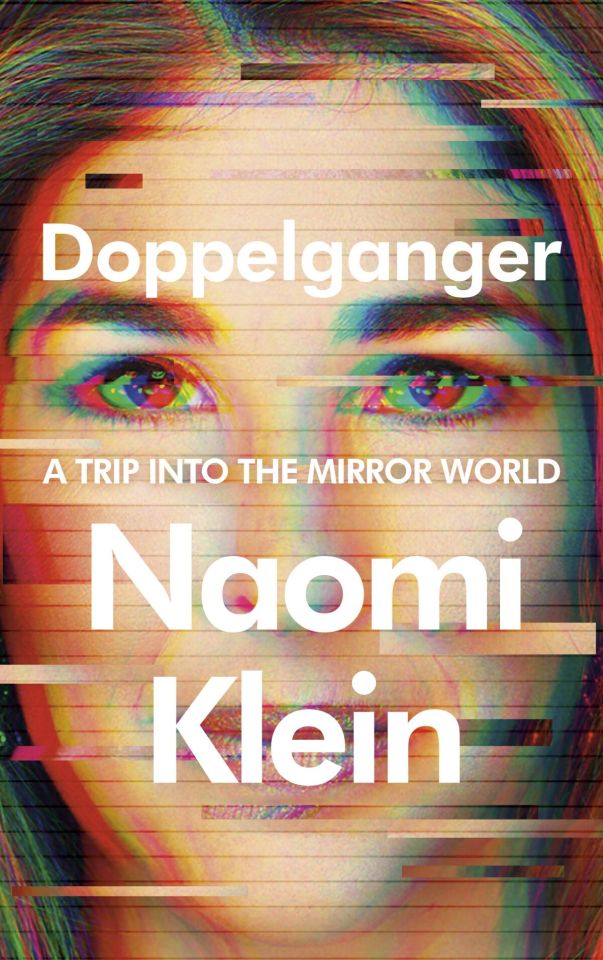
Tomorrow (September 6) at 7pm, I'll be hosting Naomi Klein at the LA Public Library for the launch of Doppelganger.
On September 12 at 7pm, I'll be at Toronto's Another Story Bookshop with my new book The Internet Con: How to Seize the Means of Computation.

If the Naomi be Klein you’re doing just fine If the Naomi be Wolf Oh, buddy. Ooooof.
I learned this rhyme in Doppelganger, Naomi Klein's indescribable semi-memoir that is (more or less) about the way that people confuse her with Naomi Wolf, and how that fact has taken on a new urgency as Wolf descended into conspiratorial politics, becoming a far-right darling and frequent Steve Bannon guest:
https://us.macmillan.com/books/9780374610326/doppelganger
This is a very odd book. It is also a very, very good book. The premise – exploring the two Naomis' divergence – is a surprisingly sturdy scaffold for an ambitious, wide-ranging exploration of this very frightening moment of polycrisis and systemic failure:
https://www.youtube.com/watch?v=lCjcwVhFhTA
Wolf once had a cluster of superficial political and personal similarities to Klein: a feminist author of real literary ability, a Jewish woman, and, of course, a Naomi. Klein grew accustomed to being mistaken for Wolf, but never fully comfortable. Wolf's politics were always more Sheryl Sandberg than bell hooks (or Emma Goldman). While Klein talked about capitalism and class and solidarity, Wolf wanted to "empower" individual women to thrive in a market system that would always produce millions of losers for every winner.
Fundamentally: Klein is a leftist, Wolf was a liberal. The classic leftist distinction goes: leftists want to abolish a system where 150 white men run the world; liberals want to replace half of those 150 with women, queers and people of color.
The past forty years have seen the rise and rise of a right wing politics that started out extreme (think of Reagan and Thatcher's support for Pinochet's death-squads) and only got worse. Liberals and leftists forged an uneasy alliance, with liberals in the lead (literally, in Canada, where today, Justin Trudeau's Liberal Party governs in partnership with the nominally left NDP).
But whenever real leftist transformation was possible, liberals threw in with conservatives: think of the smearing and defenestration of Corbyn by Labour's right, or of the LibDems coalition with David Cameron's Tories, or of the Democrats' dirty tricks to keep Bernie from appearing on the national ballot.
Lacking any kind of transformational agenda, the liberal answer to capitalism's problems always comes down to minor tweaks ("making sure half of our rulers are women, queers and people of color") rather than meaningful, structural shifts. This leaves liberals in the increasingly absurd position of defending the indefensible: insisting that the FDA shouldn't be questioned despite its ghastly failures during the opioid epidemic; claiming that the voting machine companies whose defective products have been the source of increasingly urgent technical criticism are without flaw; embracing the "intelligence community" as the guardians of the best version of America; cheerleading for deindustrialization while telling the workers it harmed with "learn to code"; demanding more intervention in speech by our monopolistic tech companies; and so on.
It's not like leftists ever stopped talking about the importance of transformation and not just reform. But as the junior partners in the progressive coalition, leftists have been drowned out by liberal reformers. In most of the world, if you are worried about falling wages, corporate capture of government, and scientific failures due to weak regulators, the "progressive" answer was to tell you it was all in your head, that you were an unhinged conspiratorialist:
https://doctorow.medium.com/the-swivel-eyed-loons-have-a-point-3434d7cbfae2
For Klein, it's this failure that the faux-populist right has exploited, redirecting legitimate anger and fear into racist, xenophobic, homophobic, sexist and transphobic rage. The deep-pocketed backers of the conservative movement didn't just find a method to get turkeys to vote for Christmas – progressives created the conditions that made that method possible.
If progressives answer pregnant peoples' concerns about vaccine risks – concerns rooted in the absolute failure of prenatal care – with dismissals, while conservatives accept those concerns and funnel them into conspiratorialism, then progressives' message becomes, "We are the movement of keeping things as they are," while conservatives become the movement of "things have to change." Think here of the 2016 liberal slogan, "America was already great," as an answer to the faux-populist rallying cry, "Make America great again."
When liberals get to define what it means to be "progressive," the fundamental, systemic critique is swept away. Conservatives – conservatives! – get to claim the revolutionary mantle, to insist that they alone are interested in root-and-branch transformation of society.
Like the two Naomis, conservatives and progressives become warped mirrors of one another. The progressive campaign for bodily autonomy is co-opted to be the foundation of the anti-vax movement. This is the mirror world, where concerns about real children – in border detention, or living in poverty in America – are reflected back as warped fever-swamp hallucinations about kids in imaginary pizza restaurant basements and Hollywood blood sacrifice rituals. The mirror world replaces RBG with Amy Coney-Barrett and calls it a victory for women. The mirror world defends workers by stoking xenophobic fears about immigrants.
But progressives let it happen. Progressives cede anti-surveillance to conservatives, defending reverse warrants when they're used to enumerate Jan 6 insurrectionists (nevermind that these warrants are mostly used to round up BLM demonstrators). Progressives cede suspicion of large corporations to conservatives, defending giant, exploitative, monopolistic corporations so long as they arouse conservative ire with some performative DEI key-jingling. Progressives defend the CIA and FBI when they're wrongfooting Trump, and voting machine vendors when they're turned into props for the Big Lie.
These issues are transformed in the mirror world: from grave concerns about real things, into unhinged conspiracies about imaginary things. Urgent environmental concerns are turned into a pretense to ban offshore wind turbines ("to protect the birds"). Worry about gender equality is transformed into seminars about women's representation in US drone-killing squads.
For Klein, the transformation of Wolf from liberal icon – Democratic Party consultant and Lean-In-type feminist icon – to rifle-toting Trumpling with a regular spot on the Steve Bannon Power Hour is an entrypoint to understanding the mirror world. How did so many hippie-granola yoga types turn into vicious eugenicists whose answer to "wear a mask to protect the immunocompromised" is "they should die"?
The PastelQ phenomenon – the holistic medicine and "clean eating" to QAnon pipeline – recalls the Nazi obsession with physical fitness, outdoor activities and "natural" living. The neoliberal transformation of health from a collective endeavor – dependent on environmental regulation, sanitation, and public medicine – into a private one, built entirely on "personal choices," leads inexorably to eugenics.
Once you start looking for the mirror world, you see it everywhere. AI chatbots are mirrors of experts, only instead of giving you informed opinions, they plagiarize sentence-fragments into statistically plausible paragraphs. Brands are the mirror-world version of quality, a symbol that isn't a mark of reliability, but a mark of a mark, a sign pointing at nothing. Your own brand – something we're increasingly expected to have – is the mirror world image of you.
The mirror world's overwhelming motif is "I know you are, but what am I?" As in, "Oh, you're a socialist? Well, you know that 'Nazi' stands for 'National Socialist, right?" (and inevitably, this comes from someone who obsesses over the 'Great Replacement' and considers themself a 'race realist').
This isn't serious politics, but it is seriously important. "Antisemitism is the socialism of fools," its obsession with "international bankers" the mirror-world version of the real and present danger from big finance and private equity wreckers. And, as Klein discusses with great nuance and power, the antisemitism discussion is eroded from both sides: both by antisemites, and by doctrinaire Zionists who insist that any criticism of Israel is always and ever antisemetic.
As a Jew in solidarity with Palestinians, I found this section of the book especially good – thoughtful and vigorous, pulling no punches and still capturing the discomfort aroused by this deliberately poisoned debate.
This thoughtful, vigorous prose and argumentation deserves its own special callout here: Klein has produced a first-rate literary work just as much as this is a superb philosophical and political tome. In this moment where the mirror world is exploding and the real world is contracting, this is an essential read.
I'll be Klein's interlocutor tomorrow night (Sept 6) at the LA launch for Doppelganger. We'll be appearing at 7PM at the @LAPublicLibrary:
https://lafl.org/ALOUD
Livestreaming at:
https://youtube.com/live/jIoAh-jxb2k

If you'd like an essay-formatted version of this post to read or share, here's a link to it on pluralistic.net, my surveillance-free, ad-free, tracker-free blog:
https://pluralistic.net/2023/09/05/not-that-naomi/#if-the-naomi-be-klein-youre-doing-just-fine


#naomi klein#naomi wolf#conspiratorialism#climate#shock doctrine#race#antisemitism#gender#feminism#books#reviews#no logo#corporatism#heel turns#realignment#power#leftism vs liberalism#gift guide#rabbit holes#memoir#israel#zionism#pluralistic
273 notes
·
View notes
Text
Reposted from @arguablysomaya on Instagram. They want us exhausted, burntout, numb, and hopeless. This situation can and will change. Rest, connect, engage in self-care. Find joy where you can. Do not let yourself become despairing and paralyzed. They are afraid of our power, and we can use it. Don't give up.
3 notes
·
View notes
Text
Thoughts while watching YouTube videos of so-called "Karens" going berserk and Getting Their Just Desserts
Has anyone perhaps imagined, on seeing videos of that ilk which go into displays of the old ultraviolence, what such would look like if, just before the proverbial line was crossed into mayhem, the whole suddenly (and without warning to viewers, mind you--especially such who might be easily attracted to the potential of pulling off copycat displays, excusing God, Donald Trump and Country as their defence all along) cut away to a classic specimen of Hanna-Barbera flicktoonry, thereby catching the target audience off guard?
#hanna barbera#random musings#distractives#karens gone berserk#police videos#shock doctrine#karma#imagine the reaction#hannabarberaforever
2 notes
·
View notes
Text
"...many have begun to question whether private corporations should be allowed to siphon off a vital public resource, then sell it back to citizens as bottled water."
The framing here is really something, isn't it. "Many have begun to question..."
4 notes
·
View notes
Text
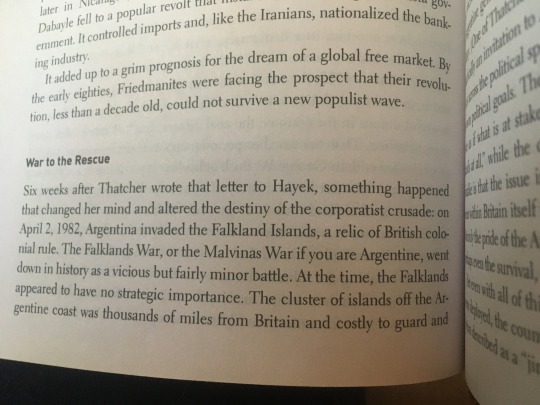
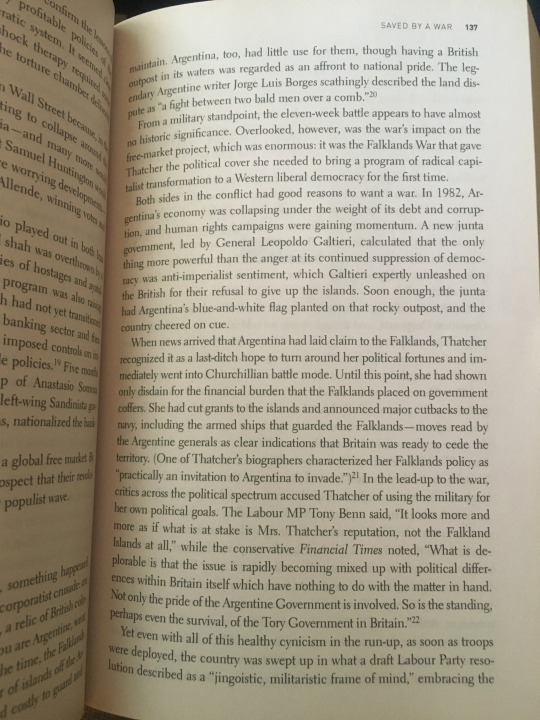

"a fight between two bald men over a comb."
War to the Rescue
Six weeks after Thatcher wrote that letter to Hayek, something happened that changed her mind and altered the destiny of the corporatist crusade: on April 2, 1982, Argentina invaded the Falkland Islands, a relic of British colonial rule. The Falklands War, or the Malvinas War if you are Argentine, went down in history as a vicious but fairly minor battle. At the time, the Falklands appeared to have no strategic importance. The cluster of islands off the Argentine coast was thousands of miles from Britain and costly to guard and maintain. Argentina, too, had little use for them, though having a British outpost in its waters was regarded as an affront to national pride. The legendary Argentine writer Jorge Luis Borges scathingly described the land dispute as "a fight between two bald men over a comb."20
From a military standpoint, the eleven-week battle appears to have almost no historic significance. Overlooked, however, was the war's impact on the free-market project, which was enormous: it was the Falklands War that gave Thatcher the political cover she needed to bring a program of radical capitalist transformation to a Western liberal democracy for the first time.
Both sides in the conflict had good reasons to want a war. In 1982, Argentina's economy was collapsing under the weight of its debt and corrup-tion, and human rights campaigns were gaining momentum. A new junta government, led by General Leopoldo Galtieri, calculated that the only thing more powerful than the anger at its continued suppression of democracy was anti-imperialist sentiment, which Galtieri expertly unleashed on the British for their refusal to give up the islands. Soon enough, the junta had Argentina's blue-and-white flag planted on that rocky outpost, and the country cheered on cue.
When news arrived that Argentina had laid claim to the Falklands, Thatcher recognized it as a last-ditch hope to turn around her political fortunes and immediately went into Churchillian battle mode. Until this point, she had shown only disdain for the financial burden that the Falklands placed on government coffers. She had cut grants to the islands and announced major cutbacks to the navy, including the armed ships that guarded the Falklands— moves read by the Argentine generals as clear indications that Britain was ready to cede the territory. (One of Thatcher's biographers characterized her Falklands policy as "practically an invitation to Argentina to invade.")21 In the lead-up to the war, critics across the political spectrum accused Thatcher of using the military for her own political goals. The Labour MP Tony Benn said, "It looks more and more as if what is at stake is Mrs. Thatcher's reputation, not the Falkland Islands at all," while the conservative Financial Times noted, "What is deplorable is that the issue is rapidly becoming mixed up with political differences within Britain itself which have nothing to do with the matter in hand.
Not only the pride of the Argentine Government is involved. So is the standing, perhaps even the survival, of the Tory Government in Britain. Yet even with all of this healthy cynicism in the run-up, as soon as troops were deployed, the country was swept up in what a draft Labour Party resolution described as a "jingoistic, militaristic frame of mind," embracing the
Falkland Islands as a last blast of glory for Britain's faded empire. 3 Thatcher praised the "Falklands spirit" gripping the nation, which in practice meant phat shouts of "Ditch the bitch!" subsided while "Up Your Juntal!" shits sold briskly.24 Neither London nor Buenos Aires made any serious attemptto avoid a showdown. Thatcher brushed aside the United Nations much as Bush and Blair did in the run-up to the war in Iraq, uninterested in sanctions or negotiations. Glorious victory was the only outcome that either side had any interest in.
Thatcher was fighting for her political future-and she succeeded spec-tacularly. After the Falklands victory, which took the lives of 255 British soldiers and 655 Argentines, the prime minister was heralded as a war hero, her monike "Iron Lady transformed from insult to high praise? Her poll numbers were similarly transformed. Thatcher's personal approval rating more than doubled over the course of the battle, from 25 percent at the start to 59 percent at the end, paving the way for a decisive victory in the following year's election.
#malvinas#falklands#Margaret Thatcher#naomi klein#shock doctrine#books#imperialism#capitalism#colonialism#argentina#war
2 notes
·
View notes
Text





2 notes
·
View notes
Text
Vague image ID: a wall of text explaining that if you are feeling too overwhelmed to do anything, because of the flurry of executive orders, and stuff that the Trump White House has been doing, according to experts, that feeling of overwhelm is the intention. Them doing so much all at once are intending to overwhelm people like you and I into not resisting or doing anything. Thus, this is one of the few really useful things you should read going forward if you wanna be prepared. 
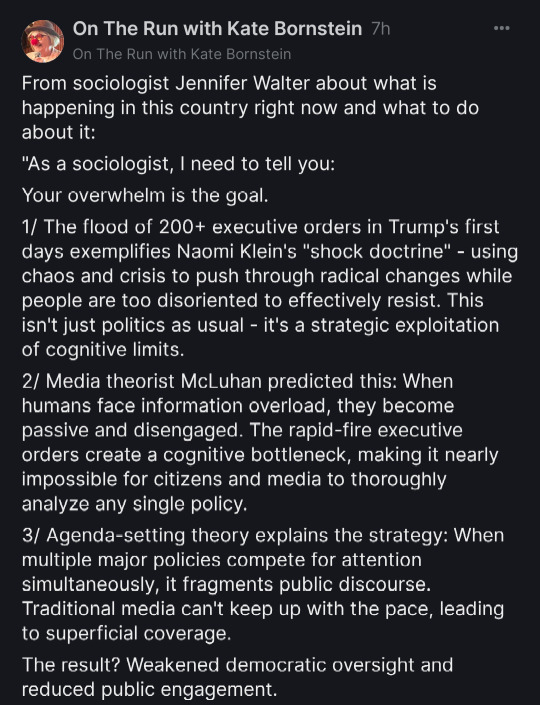
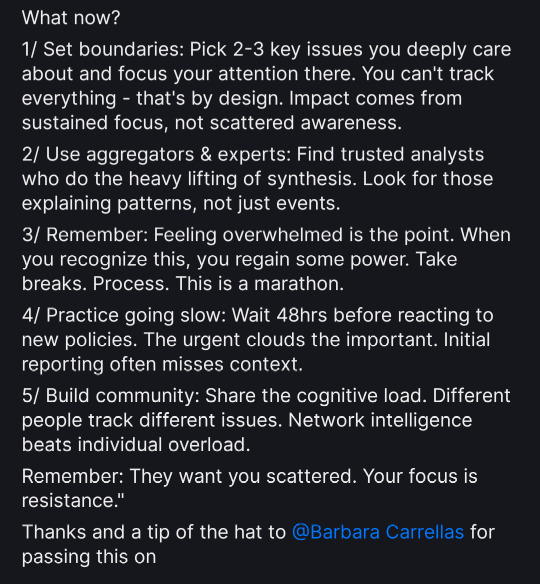
posted on Kate Bornstein's substack
24K notes
·
View notes
Link
Meet the intellectual dark web
#Phoenix Program#Vietnam#migration#shock doctrine#social engineering#cybernetics#creative destruction#Tavistock Institute#CIA#dispossession#deprogramming#mental hygiene#psychological warfare
1 note
·
View note
Text
Bush Dubya claims no advance knowledge of 9/11
#same playbook#different country and decade#shock doctrine#attack yourself blame your enemy sock puppets and commit atrocities
0 notes
Text
Podcasting "Ideas Lying Around"

This week on my podcast, I read my recent Medium column, “Ideas Lying Around: Milton Friedman was a monster, but he wasn’t wrong about this,” which I describe a theory of change for unrigging markets, addressing the climate emergency, building worker power and fixing the imbalance between news publishers and Big Tech:
https://doctorow.medium.com/ideas-lying-around-33a28901a7ae
What is this amazing theory of change, that can do so much to right the world’s wrongs? Fittingly, it’s the same theory of change that got us into this mess. It’s Milton Friedman’s theory of change.
Friedman was the archduke of neoliberal economics, the man who led the counter-reformation that destroyed the gains of the New Deal and the Great Society, restored corporate monopolies to primacy over democratically accountable government, gutted labor power, and put the world in the hands of mediocre, narcissistic billionaires who are determined to set it on fire.
We live in Friedman’s world, but it wasn’t always thus. When Friedman set out to restore America’s deposed oligarchs to their Gilded Age thrones, his ideas were incredibly unpopular. The post-war reforms — trustbusting, unions, environmental and labor protections, Social Security, etc — were wildly popular. Year after year, these reforms grew, and the groups who had been excluded from them — women, racialized people, queer people, colonized people — launched liberation movements demanding (and winning) inclusion in this broad prosperity.
Friedman’s financiers and acolytes — plutocrats and the temporarily embarrassed millionaires who aspired to join them in despotic rule — loved Friedman’s vision, but they were naturally skeptical that he could make it into reality. They had been painfully disabused of the notion that their social inferiors were comforted by a life of forelock-tugging servitude:
https://doctorow.medium.com/the-end-of-the-road-to-serfdom-bfad6f3b35a9
How would Friedman convince these sharp-elbowed proles to go back belowstairs and stay there? Friedman had an answer:
Only a crisis — actual or perceived — produces real change. When that crisis occurs, the actions that are taken depend on the ideas that are lying around. That, I believe, is our basic function: to develop alternatives to existing policies, to keep them alive and available until the politically impossible becomes the politically inevitable.
Even the best-run society is subject to exogenous shocks — pandemic, invasion, natural disaster, meteor strike — and in the reeling dislocation of the crisis, people will turn to the loudest, most persistent critics of the failed status quo, desperate for alternatives.
Friedman got his crisis. In 1973, OPEC cut off the global supply of oil, and plunged the world into recession. The source of the recession was obvious: OPEC didn’t keep it a secret. But Friedman and his pals were able to convince the people shivering in the dark that their pain was caused by women’s lib, labor unions, civil rights and the EPA. In the crisis, his ideas moved from the periphery to the center.
Jimmy Carter got the ball rolling, adopting Friedman’s proposals for coddling monopolies and forcing workers out of guaranteed pensions and into the market’s rigged casino, where they would bet their 401(k)s against shrewd stock brokers for the chance of a dignified retirement:
Next came Ronald Reagan, who incinerated whole libraries’ worth of regulations that protected the American people from corporate predators, gutted unions and ripped out society’s steering wheel and brakes and set it rolling towards extinction’s cliff, whose brink we can see growing closer daily:
https://locusmag.com/2022/07/cory-doctorow-the-swerve/
Friedman’s been in hell since 2006, but we live in Friedman’s world. His ideas are firmly rooted in the center, and the ideas that delivered environmental regulation, decent jobs, and progress on gender and racial equality have been banished to the periphery.
But there will be crises. As Stein’s Law goes, “anything that can’t go on forever will eventually stop.” In every domain of human endeavor, we lurch from crisis to crisis: labor, climate, discrimination, corruption. Each of these crises is terrible, and each one is an opportunity for ideas lying around to rush into the center currently occupied by Friedman’s intellectual descendants.
80 years on, Woody Guthrie’s 1943 New Year’s Resolutions are a hell of a read, and not a day goes by that I don’t think of number 19: “Keep hoping machine running.”
https://www.townandcountrymag.com/society/news/a9130/woody-guthrie-resolutions/
My hoping machine runs on the creation and spreading of ideas lying around. Last year, Rebecca Giblin and I published Chokepoint Capitalism: How Big Tech and Big Content Captured Creative Labor Markets and How We’ll Win Them Back:
https://chokepointcapitalism.com/
The first half of the book consists of detailed explanations of the scams that the highly concentrated tech and entertainment sectors use to reduce the income of creative workers, even as their own profits rise to never-seen heights. Readers tell us that by the time they’re reached the book’s midpoint, they hear the dangerous, high-pitched keening that signals an incipient rage aneurysm.
But the second half of the book consists entirely of detailed, shovel-ready, systemic reforms that would make immediate, significant shifts in the pay creative workers get for their labor. None of these are individual solutions: we don’t tell you how to shop better or other consumerist theater. You’re not going to shop your way out of monopoly capitalism — no more than you’re going to recycle your way out of the climate emergency.
These are meant to be ideas lying around — ideas that are more than “let’s just make copyright last longer or cover more works,” which is all we’ve done for 40 years, to disastrous effect. After all, giving an artist more copyright to bargain with five publishers, four studios, three labels, two ad-tech companies or the one ebook/audiobook company is like giving your bullied kid extra lunch money. There isn’t an amount of lunch money that will get that kid lunch. You’ve gotta do something about the bullies. Hence the back half of Chokepoint Capitalism — ideas lying around for unrigging labor markets, to be deployed in a crisis.
On those lines: for the past month, EFF and I have been publishing a series called “Saving the News From Big Tech”:
https://www.eff.org/deeplinks/2023/04/saving-news-big-tech
This series lays out four ��ideas lying around” for fixing the real problem with Big Tech’s relationship to the news: stealing money by rigging ads, payments and social media, so that 51% of every ad dollar and 30% of every app-based subscription goes to a tech giant, and news companies have to spend whatever they have left to “boost” their social media posts to reach the subscribers who asked to see their stuff.
News is in (perpetual) crisis, and, as with creative labor markets, the “solution” of first resort is to force tech companies to share their profits with news companies. This makes the news and tech into partners, just at the moment where we’re relying on news to investigate tech and expose its rot. It also favors the largest news companies, which are overwhelmingly either billionaires’ playthings or skeleton-crewed ghost ships owned by private equity looters.
The ideas (lying around) I develop with EFF are designed to prevent tech from reaping its illegitimate profits, making it weaker and making the press stronger, including indie news outlets, from nonprofits to spunky outlets run by laid-off reporters who are determined to bring their readers real news.
Fiction is also a great way to create ideas lying around. My next novel, The Lost Cause, is a science fiction thriller set in a world where the Green New Deal is underway and people are confronting, rather than denying, the scale and urgency of the climate emergency. It’s a novel full of joy, an emotional flythrough of what it would feel like to formulate and execute a plan to save ourselves, rather than hoping that the threat just goes away on its own:
https://us.macmillan.com/books/9781250865939/the-lost-cause
Kim Stanley Robinson describes The Lost Cause thus:
This book looks like our future and feels like our present — it’s an unforgettable vision of what could be. Even a partly good future will require wicked political battles and steadfast solidarity among those fighting for a better world, and here I lived it along with Brooks, Ana Lucía, Phuong, and their comrades in the struggle. Along with the rush of adrenaline I felt a solid surge of hope. May it go like this.
I am a firm believer in the power of ideas lying around, and I admit to feeling a guilty pleasure every time I cite Friedman’s own words. I like to think that whenever he hears his words in my mouth, he looks up from the spit he’s turning on in Hell, and amuses the demons turning the crank by gargling a curse around the red-hot bar protruding from his jaws.
Here’s the podcast episode:
https://craphound.com/news/2023/06/11/ideas-lying-around/
And here’s a direct link to the MP3 (hosting courtesy of the Internet Archive, they’ll host your stuff for free, forever):
https://ia802608.us.archive.org/28/items/Cory_Doctorow_Podcast_445/Cory_Doctorow_Podcast_445_-_Ideas_Lying_Around.mp3
And here’s a link to subscribe to my podcast’s RSS feed:
https://feeds.feedburner.com/doctorow_podcast

If you’d like an essay-formatted version of this post to read or share, here’s a link to it on pluralistic.net, my surveillance-free, ad-free, tracker-free blog:
https://pluralistic.net/2023/06/12/only-a-crisis/#lets-gooooo

[Image ID: A workbench with a pegboard behind it. from the pegboard hang an array of hand-tools.]

Image: btwashburn (modified) https://commons.wikimedia.org/wiki/File:Garage_Workbench_-_%281%29.jpg
CC BY 2.0 https://creativecommons.org/licenses/by/2.0/deed.en
#pluralistic#ideas lying around#podcasts#mp3s#audio#saving the news from big tech#theories of change#milton friedman#shock doctrine#chokepoint capitalism#the lost cause
45 notes
·
View notes
Text
It’s called the shock doctrine and that’s how it works! They didn’t see COVID and think “someone has to do something!”, they thought “what are my goals and how can I use this to pursue them?” This is how they use tragedies and crises. They look for every opportunity to increase their advantage. All those forgiven loans? They knew it was a grift from the start.
Also, fuck me, why does it keep feeling, more and more, that COVID really just opened all these studios/streaming-services to treat the people actually making their shows and movies like crap but still rake in record profits.
Cut that shite out; holy fuck. You have to spend money in order to keep money flowing, assholes! And a good chunk of that is -- GASP -- paying the people who make your shit.
5K notes
·
View notes
Text
Just picture this announcement suddenly appearing in the middle of the Tea Time Movie:
The screen suddenly cuts from the fast-talking Art Fern and his Matinee Lady to a card proclaiming LATE PROGRAMMING CHANGE
The announcer (off camera, know) proclaiming in rather stentorian tone "Ladies and gentlemen, we regret to announce that the scheduled film presentation, 'Tarzan Breaks His Loincloth,' will not be shown as previously announced; instead, we have chosen to present the following ..."
Cut to a set not unlike something that would have been used on some cheap-looking travelogue or adventure-film series in the Bill Burrud vein, wherein we find Peter Potamus relating some diving experiences (with accompanying film) involving the Three Wolves and the Divin' Wolf Pups. (Peter "himself" in the safari jacket and pith helmet otherwise associate with him.)
If that doesn't exactly shock and confuse the mainly "poor white trash" audience falling for the Tea Time Movie and its generally tacky and disreputable offers--
#hanna barbera#headcannons#random musings#tea time movie#shock doctrine#last minute change#programming change#art fern and the matinee lady#peter potamus#diving film#hannabarberaforever
0 notes
Text



In 1962, Gisèle Halimi, a French lawyer for several Algerians who had been brutally raped and tortured in prison, wrote in exasperation, "The words were the same stale clichés: ever since torture had been used in Algeria there had always been the same words, the same expression of indigna-tion, the same signatures to public protests, the same promises. This automatic routine had not abolished one set of electrodes or water-hoses; nor had it in any remotely effective way curbed the power of those who used them." Simone de Beauvoir, writing on the same subject, concurred: "To protest in the name of morality against 'excesses' or 'abuses' is an error which hints at active complicity. There are no 'abuses' or 'excesses' here, simply an all-pervasive system."24
Her point was that the occupation could not be done humanely; there is no humane way to rule people against their will. There are two choices, Beauvoir wrote: accept occupation and all the methods required for its en-forcement, "or else you reject, not merely certain specific practices, but the greater aim which sanctions them, and for which they are essential." The same stark choice is available in Iraq and Israel/Palestine today, and it was the only option in the Southern Cone in the seventies. Just as there is no kind, gentle way to occupy people against their determined will, there is no peaceful way to take away from millions of citizens what they need to live with dignity —which is what the Chicago Boys were determined to do. Robbery, whether of land or a way of life, requires force or at least its credible threat; it's why thieves carry guns, and often use them. Torture is sickening, but it is often a highly rational way to achieve a specific goal; indeed, it may be the only way to achieve those goals. Which raises the deeper question, one that so many were incapable of asking at the time in Latin America. Is neoliberalism an inherently violent ideology, and is there something about its goas that demands this cycle of brutal political cleansing, followed by human rights cleanup operations?
One of the most moving testimonies on this question comes from Sergio Tomasella, a tobacco farmer and secretary-general of Argentina's Agrarian Leagues, who was tortured and imprisoned for five years, as were his wife and many friends and family members.* In May 1990, Tomasella took the overnight bus to Buenos Aires from the rural province of Corrientes in order to add his voice to the Argentine Tribunal against Impunity, which was hearing testimony on human rights abuses during the dictatorship.
Tomasella's testimony was different from the others. He stood before the urban audience in his farming clothes and work boots and explained that he was the casualty of a long war, one between poor peasants who wanted pieces of land to form cooperatives and the all-powerful ranchers who owned half the land in his province. "The line is continuous —those who took the land from the Indians continue to oppress us with their feudal structures." He insisted that the abuse he and his fellow members of the Agrarian Leagues suffered could not be isolated from the huge economic interests served by the breaking of their bodies and destruction of their activist net-works. So instead of naming the soldiers who abused him, he chose to name the corporations, both foreign and national, that profit from Argentina's continued economic dependence. "Foreign monopolies impose crops on us, they impose chemicals that pollute our earth, impose technology and ideol-ogy. All this through the oligarchy which owns the land and controls the pol-itics. But we must remember —the oligarchy is also controlled, by the very same monopolies, the very same Ford Motors, Monsanto, Philip Morris. It's the structure we have to change. This is what I have come to denounce.
That's all.".
The auditorium erupted in applause. Tomasella concluded his testimony with these words: "I believe that truth and justice will eventually triumph. It will take generations. If I am to die in this fight, then so be it. But one day we will triumph. In the meantime, I know who the enemy is, and the enemy knows who I am, too.'
The Chicago Boys' first adventure in the seventies should have served as a warning to humanity: theirs are dangerous ideas. By failing to hold the ideology accountable for the crimes committed in its first laboratory, this subculture of unrepentant ideologues was given immunity, freed to scour the world for its next conquest. These days, we are once again living in an era of corporatist massacres, with countries suffering tremendous military violence alongside organized attempts to remake them into model "free market" economies; disappearances and torture are back with a vengeance. And once again the goals of building free markets, and the need for such brutality, are treated as entirely unrelated.
#naomi klein#capitalism#imperialism#colonialism#simone de beauvoir#shock doctrine#dictatorship#palestine#ford motors#monsanto#philip morris#general motors#books
3 notes
·
View notes
Text
If Jonestown was coordinated by US intelligence agencies... why?
The four paragraphs below are excerpted from Jim Jones, MK-ULTRA Poster Child? by Peoples Temple ex-member Kathy (Tropp) Barbour. Bolding added for emphasis.
The world since Jonestown
Jonestown is the black hole of history, the invisible line at which history turned and the US population, still in shock, turned with it, into what it is today.
With 38 years of hindsight, still as a fly on the wall, I see that the CIA more than triumphed on this one. Not just were 918 lives lost, the worldwide shock, and revulsion associated with all things integration, communitarian, and left-wing was ushered in. Four days after the final number of the dead was known, the assassination of Milk and Moscone occurred in San Francisco. Classic “shock doctrine” brought home.
Then began the unwinding, the turning by degrees of battleship USA from an antiwar, antinuclear consensus, to our present perpetual war posture, frog-march though it may be. It is more a stupefaction, a paralysis in comprehension of daily events and their significance to us amid the blur of technological change. There began the rollout of goodness and purity to be found only in acquisition, consumption and diversion, surrender to the warm and fuzzy world of entertainers and advertisers ready to fulfill us, make or remake us.
No antennae for anything else. No more history, no more civics, no more news, eventually. Another crop of perfect subjects.
Barbour makes it clear that Jonestown had a very cultural, psychological, and political effect, and even intended effect, on the masses. She even connects the events of 1978 to the idea of “shock doctrine.”

Now.. what is shock doctrine?
Shock doctrine is roughly the imperialist trend of using disasters and crises to push and implement free market, neoliberal policies, taking advantage of collective shock. Some have said that
Though Naomi Klein is not necessarily an articulate anti-imperialist, and is no stranger to spewing unverified CIA-backed history and analyses (such as anti-communist rhetoric), her book The Shock Doctrine: The Rise of Disaster Capitalism reveals the most vital, pressing, and relevant aspects of “shock doctrine” and its history.
In one of his most influential essays, Friedman articulated contemporary capitalism's core tactical nostrum, what I have come to understand as the shock doctrine. He observed that "only a crisis—actual or perceived—produces real change. When that crisis occurs, the actions that are taken depend on the ideas that are lying around. That, I believe, is our basic function: to develop alternatives to existing policies, to keep them alive and available until the politically impossible becomes politically inevitable." Some people stockpile canned goods and water in preparation for major disasters; Friedmanites stockpile free-market ideas. And once a crisis has struck, the University of Chicago professor was convinced that it was crucial to act swiftly, to impose rapid and irreversible change before the crisis-racked society slipped back into the "tyranny of the status quo." He estimated that "a new administration has some six to nine months in which to achieve major changes; if it does not seize the opportunity to act decisively during that period, it will not have another such opportunity." A variation on Machiavelli's advice that injuries should be inflicted "all at once," this proved to be one of Friedman's most lasting strategic legacies.
What we have been living for three decades is frontier capitalism, with the frontier constantly shifting location from crisis to crisis, moving on as soon as the law catches up.
That is how the shock doctrine works: the original disaster—the coup, the terrorist attack, the market meltdown, the war, the tsunami, the hurricane — puts the entire population into a state of collective shock. The falling bombs, the bursts of terror, the pounding winds serve to soften up whole societies much as the blaring music and blows in the torture cells soften up prisoners. Like the terrorized prisoner who gives up the names of comrades and renounces his faith, shocked societies often give up things they would otherwise fiercely protect. Jamar Perry and his fellow evacuees at the Baton Rouge shelter were supposed to give up their housing projects and public schools. After the tsunami, the fishing people in Sri Lanka were supposed to give up their valuable beachfront land to hoteliers. Iraqis, if all had gone according to plan, were supposed to be so shocked and awed that they would give up control of their oil reserves, their state companies and their sovereignty to U.S. military bases and green zones.
The widespread abuse of prisoners is a virtually foolproof indication that politicians are trying to impose a system--whether political, religious or economic--that is rejected by large numbers of the people they are ruling. Just as ecologists define ecosystems by the presence of certain "indicator species" of plants and birds, torture is an indicator species of a regime that is engaged in a deeply anti-democratic project, even if that regime happens to have come to power through elections.
“Extreme violence has a way of preventing us from seeing the interests it serves.”
The change of political mood from the 70s into the 80s undoubtedly has something to do with Jonestown, as Jones himself acquainted himself with some of most well known leftist figures in the Bay Area, including the Black Panther Party, largely recognized as one of the most advanced revolutionary formations that have been organized in the U.S. That said, there were thousands of coordinated strategies in quelling the revolutionary fervor of the generation, including the use of other cults that effectively transformed leftists and left-leaning young people into conservativism, even fascism, such as with the LaRoucheites and the Moonies. Peoples Temple was not the only group to be used in such a way, or the straw that broke the camel’s back... but as a religious cult in the Bay Area, a region flooded with agents and federal experiments, that was deeply connected to militant leftists and had a history with some of the most influential and controversial Evangelicals (William Branham), there’s a lot that gets touched on when you bring up Jim Jones. The more you press into research on Jonestown and Jim Jones, the more you press into strategies, histories, and ideas that have been effectively suppressed by the U.S. government. Like the Unification Church and William Branham, the more that is uncovered about Peoples Temple, the more the true nature of the US government is reveal, and it just so happens to be the same as Satan’s: to kill, steal, and destroy.
Related links and articles below
The CIA Engineers “Islamic Terrorism” in the Philippines, Forming Abu Sayyaf
Paul Perry, or Paulo-Juarez Pereira, a CIA-Connected Moonie
CIA Organized Secret Army in Western Europe (The Washington Post)
How has the Moon network played a role in the post-9/11 U.S. Imperialist strategy?
Covert Operations and the CIA’s Hidden History in the Philippines UC member Barbara Burrowes had connections to the CIA-sponsored fascist dictatorship of Guyana
Panel Told Seoul Used Followers Of Sun Myung Moon for Protests (1978)
Who was Robert Amory Jr., the Moon Network Lawyer that was also the Deputy Director of the CIA?
CARP Members were Paid by FBI for Spying on Americans
Deprogramming Imperialism’s Collective Statement
#free market#neoliberalism#liberalism#economy#political economy#shock doctrine#jim jones#georgetown#leftist politics#politics#capitalism#imperialism#anti-capitalism#anti-imperialism#cults#intelligence agencies#cia#democracy#u.s. government#usa#united states of america
0 notes
Photo
Just imagine Scrappy-Doo appearing out of nowhere, as the old deus ex machina even, spontaneously preparing to expose shows such as these as Frauds and Deception Upon Especially Vulnerable and Less-Sophisto Audiences Otherwise Expected to Regard the Branson Music Shows as the Exemplar and Ideal of American Cultural Heritage, Identity and Folkways, and a More Logically Natural Ideal Therefor ... with Scooby-Doo and crew left to unmask all involved and expose the broader deceit.



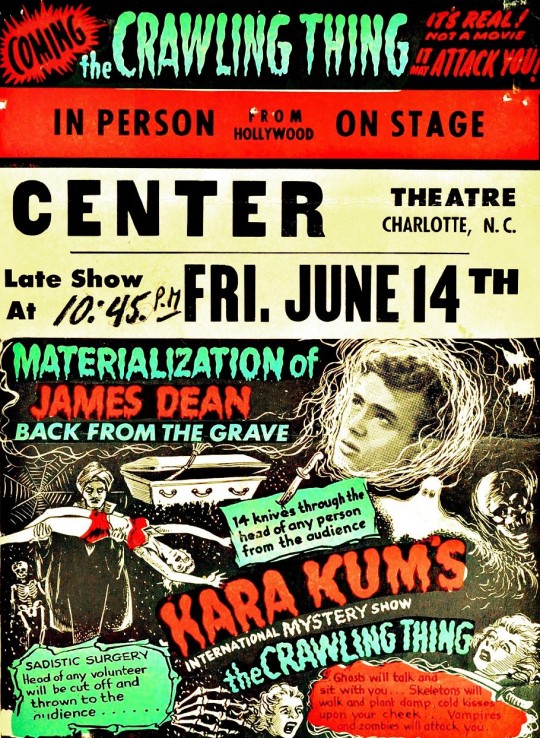
1950s-1960s Spook Shows
#hanna barbera#headcannons#spook shows#horror show#travelling show#passing show#scooby doo#scrappy doo#shock doctrine#the appeal to those of the lower classes is way too obvious#branson mo#branson music shows#cultural ideal#cultural identity#hannabarberaforever
375 notes
·
View notes